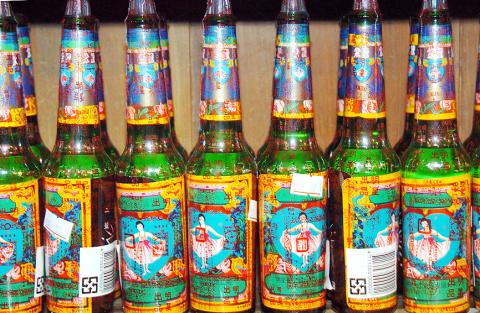A brand of aromatic water that was a staple of Taiwan’s older generation as a perfume and topical application is to make a comeback as early as Sunday after its manufacturer suspended production last year.
Ming Sing aromatic water (明星花露水), created in 1907 by Shanghai doctor Chou Chun-pang (周俊邦) with rose and jasmine extract and alcohol, is returning to the market through the Singapore-based Ethanol Group, which has taken over the license for the product from the Chou family on the condition that it retain the previous Ming Sing staff.
Ethanol Group general manager Guo Chao (郭超) on Tuesday said that it would renew the Taiwanese facilities and devote resources to the management and advertising of the product to create brand loyalty among young people.

Photo: Chang Chia-ming, Taipei Times
It plans to develop new products under the brand, such as soap, body wash and shampoo, as well as expanding the business to overseas markets, such as Southeast Asia and Africa, he added.
Ming Sing came to Taiwan in 1949 with Chou’s daughter Chou Wen-chi (周文璣), who founded Ming Sing Chemical two years later to make the aromatic water and talc powder. During the 1960s and 1970s, the water was considered a necessary product by women.
During the SARS epidemic in 2003, Ming Sing once again became popular, as it was 73 percent alcohol, which is high enough to be used as a disinfectant.
Although Ming Sing Chemical produced more than 1 million bottles per year, its owners Tsai Li-hsin (蔡禮新) and his wife, Chou Huan-chang (周環樟), decided to end operations last year, due to their age, maintaining manufacturing equipment and the trouble in traveling between their overseas residence and the Taiwanese factory.
The decision at the time prompted many people to stock up on the product, pushing up the price of Ming Sing, with people even selling it for more than NT$10,000 per bottle online.
To combat counterfeit Ming Sing on the market, the company would not rule out legal actions to protect the authentic product, Gou said.

Chinese spouse and influencer Guan Guan’s (關關) residency permit has been revoked for repeatedly posting pro-China videos that threaten national security, the National Immigration Agency confirmed today. Guan Guan has said many controversial statements in her videos posted to Douyin (抖音), including “the red flag will soon be painted all over Taiwan” and “Taiwan is an inseparable part of China,” and expressing hope for expedited reunification. The agency last year received multiple reports alleging that Guan Guan had advocated for armed reunification. After verifying the reports, the agency last month issued a notice requiring her to appear and explain her actions. Guan

A preclearance service to facilitate entry for people traveling to select airports in Japan would be available from Thursday next week to Feb. 25 at Taiwan Taoyuan International Airport, Taoyuan International Airport Corp (TIAC) said on Tuesday. The service was first made available to Taiwanese travelers throughout the winter vacation of 2024 and during the Lunar New Year holiday. In addition to flights to the Japanese cities of Hakodate, Asahikawa, Akita, Sendai, Niigata, Okayama, Takamatsu, Kumamoto and Kagoshima, the service would be available to travelers to Kobe and Oita. The service can be accessed by passengers of 15 flight routes operated by

GIVE AND TAKE: Blood demand continues to rise each year, while fewer young donors are available due to the nation’s falling birthrate, a doctor said Blood donors can redeem points earned from donations to obtain limited edition Formosan black bear travel mugs, the Kaohsiung Blood Center said yesterday, as it announced a goal of stocking 20,000 units of blood prior to the Lunar New Year. The last month of the lunar year is National Blood Donation Month, when local centers seek to stockpile blood for use during the Lunar New Year holiday. The blood demand in southern Taiwan — including Tainan and Kaohsiung, as well as Chiayi, Pingtung, Penghu and Taitung counties — is about 2,000 units per day, the center said. The donation campaign aims to boost

The Central Weather Administration (CWA) said a magnitude 4.9 earthquake that struck off the coast of eastern Taiwan yesterday was an independent event and part of a stress-adjustment process. The earthquake occurred at 4:47pm, with its epicenter at sea about 45.4km south of Yilan County Hall at a depth of 5.9km, the CWA said. The quake's intensity, which gauges the actual effects of a temblor, was highest in several townships in Yilan and neighboring Hualien County, where it measured 4 on Taiwan's seven-tier intensity scale, the CWA said. Lin Po-yu (林柏佑), a division chief at the CWA's Seismological Center, told a news conference